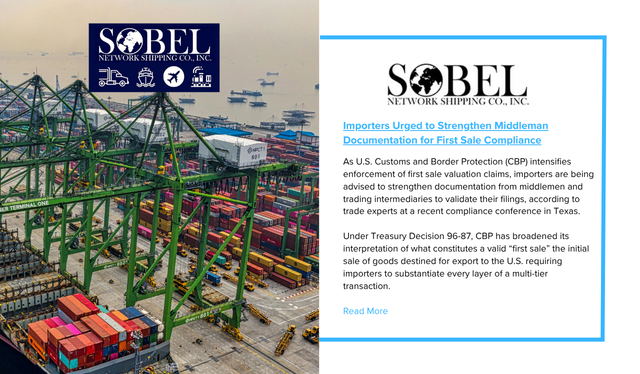As U.S. Customs and Border Protection (CBP) intensifies enforcement of first sale valuation claims, importers are being advised to strengthen documentation from middlemen and trading intermediaries to validate their filings, according to trade experts at a recent compliance conference in Texas.
Under Treasury Decision 96-87, CBP has broadened its interpretation of what constitutes a valid “first sale” — the initial sale of goods destined for export to the U.S. — requiring importers to substantiate every layer of a multi-tier transaction. The agency is increasing scrutiny on the “substance over form” of transactions, evaluating whether the sale reflects a bona fide transfer of ownership and risk, rather than a paper exercise designed to lower declared customs value.
Key Compliance Focus Areas
1. Middleman Records Under Review
CBP specialists are examining documentation such as purchase orders, cost worksheets, invoices, Incoterms, and insurance records to determine where title and risk of loss transfer. Importers under audit may be asked to produce journal entries or cost breakdowns from middlemen, including raw material, labor, and assembly costs — even when intermediaries don’t buy finished goods.
2. Heightened Enforcement in Valuation and Origin
CBP has issued a growing number of CF-28 information requests targeting valuation and country of origin declarations tied to first sale claims. The agency is also cross-referencing Section 301 (China), 232 (steel and aluminum), and AD/CVD orders, highlighting the need for consistency across valuation, sourcing, and transfer pricing documentation.
3. Reasonable Care and Due Diligence
Experts stress that demonstrating reasonable care through organized procedures, traceable records, and audit-ready documentation can mitigate penalties in the event of a review. Companies that can show active due diligence and compliance program implementation are more likely to receive leniency.
CBP’s approach increasingly compares declared margins against broader industry benchmarks, meaning importers must ensure arm’s-length transactions and commercial justification are well-supported by accounting and contractual evidence.
As enforcement ramps up, importers are encouraged to work closely with suppliers, middlemen, and trade advisors to maintain transparent documentation trails that meet CBP’s evolving compliance expectations


